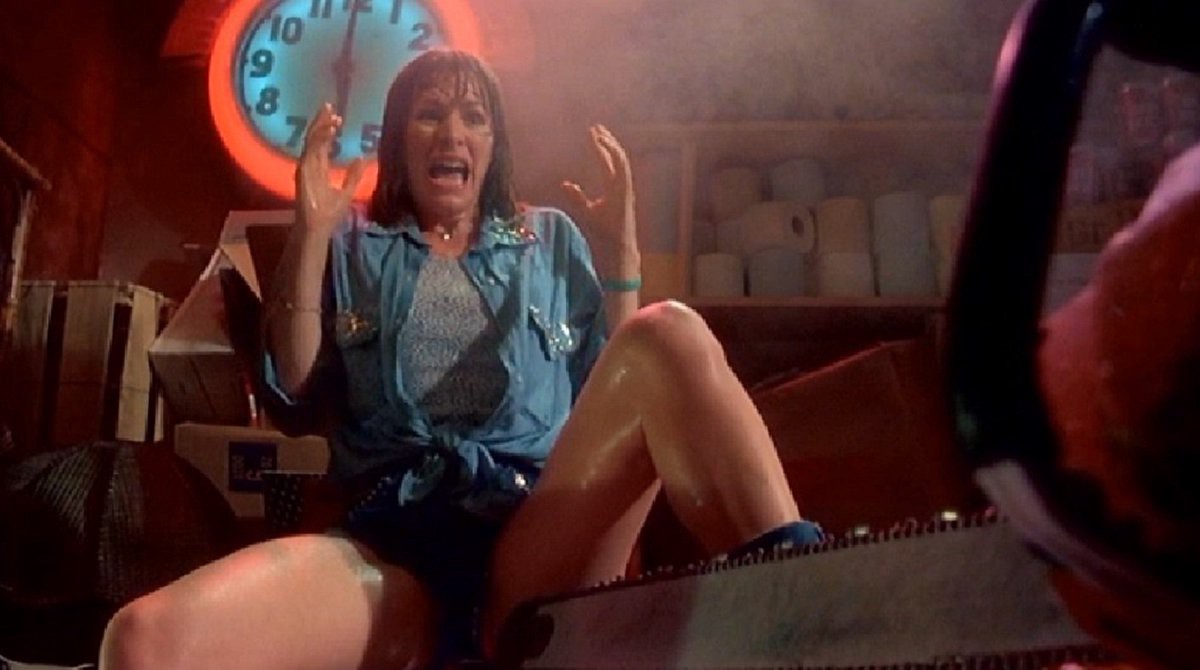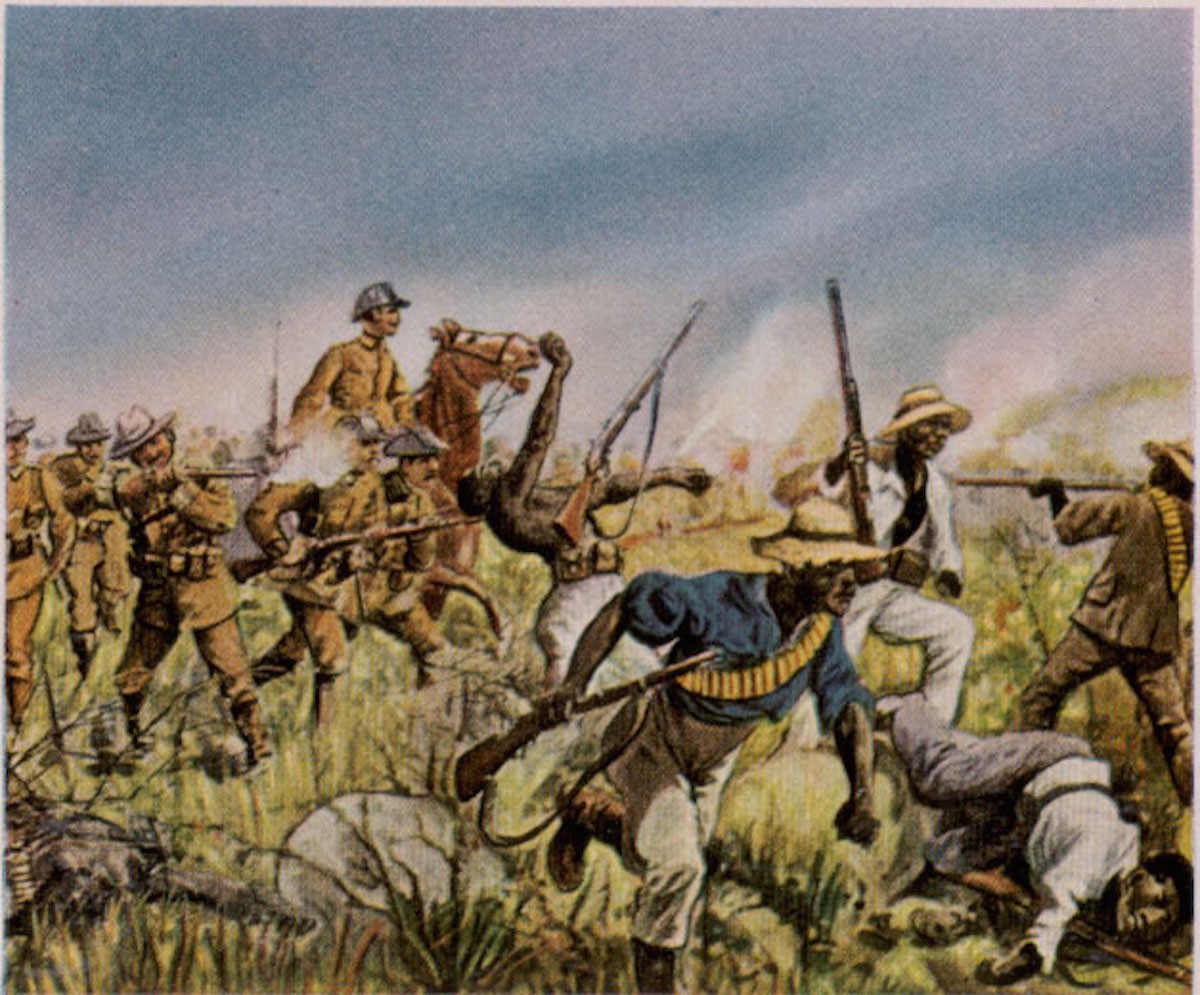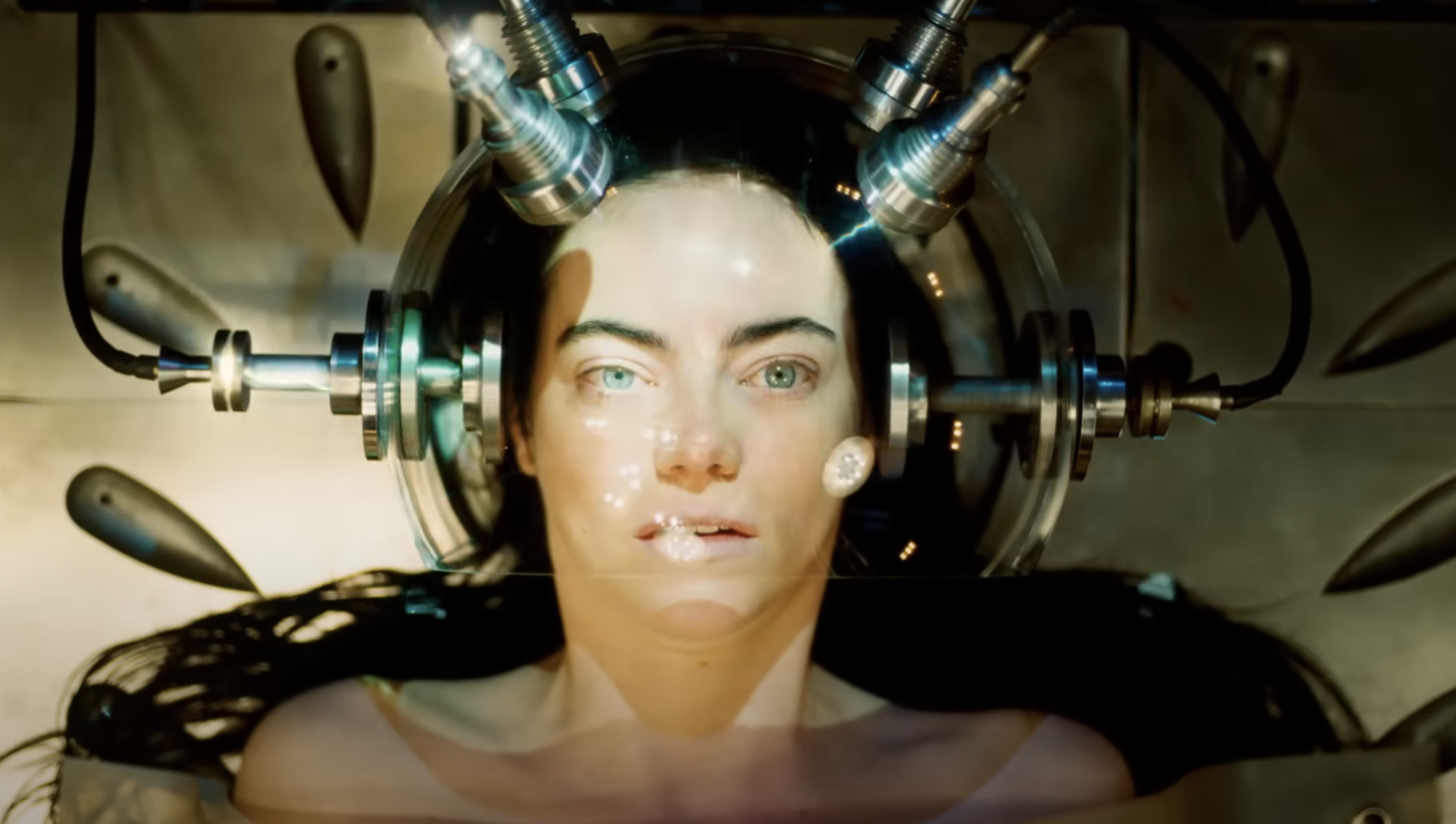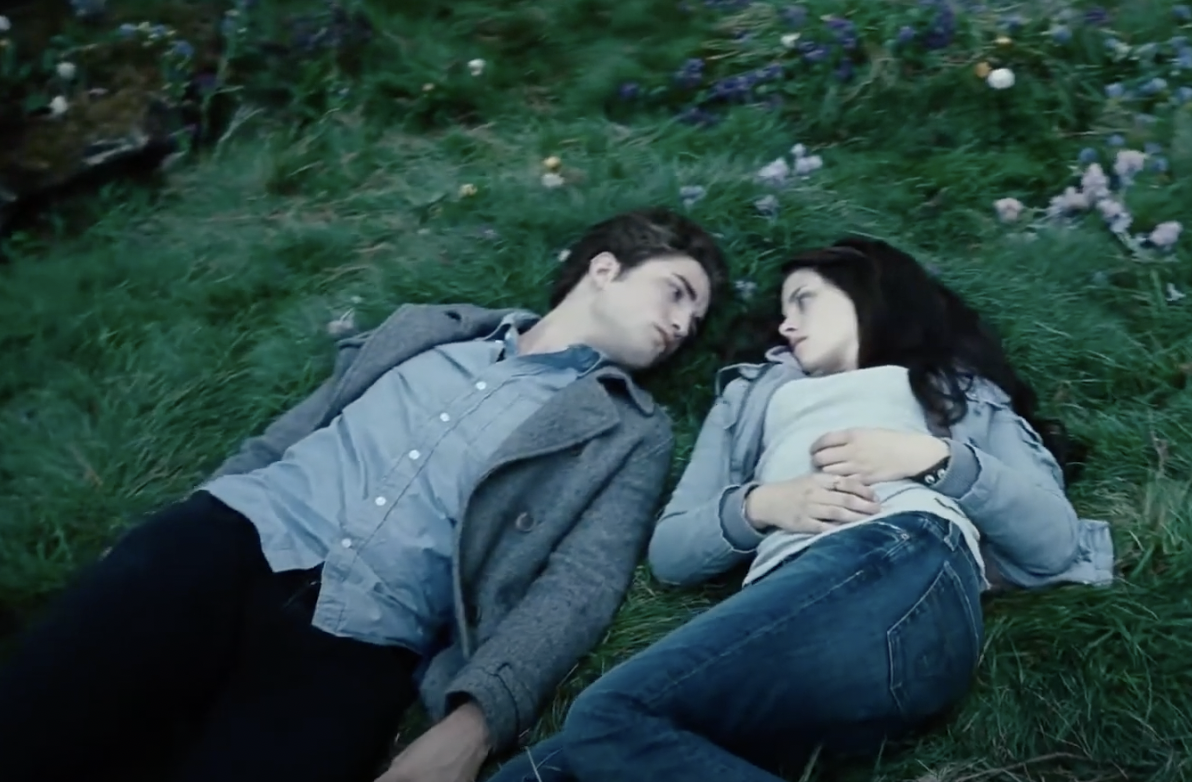Novel Gazing
Nothing Has Prepared Me For The Reality of Womanhood Better Than “Texas Chainsaw Massacre 2”
I was told that films like this exploited young women, but for me, it didn’t feel degrading—it felt familiar

Novel Gazing is Electric Literature’s personal essay series about the way reading shapes our lives. This time, we asked: What book was your feminist awakening?
On a summer day in 1998, I scanned my collection of VHS tapes to find the perfect one to take to a boy’s house. I was 16 and in something akin to lust with an old friend named Jimmy. We had only progressed to the point in our relationship where “watching movies” still at least half meant that we’d actually try to watch movies, so I was looking for something that I genuinely wanted to share. A film that might tell him something about me, something he might actually get. My beloved Videodrome had been a bust on our previous movie night– Jimmy had gotten little more out of Cronenberg’s 1982 body horror treatise on media influence than a passing thrill at seeing Deborah Harry’s boobs, and I’d retreated to my room to write angry Marshall McLuhan-referencing poetry the second that he left. So I wanted something slightly more accessible that would still be weird enough to show him a piece of my soul. That film, I decided, was Texas Chainsaw Massacre 2.
I appreciated the groundbreaking nature of Tobe Hooper’s original 1974 Texas Chainsaw Massacre, but it was his perversely goofy follow-up that had my heart. Some of the reasons were easy enough for me to articulate: I was impressed by the loopy audacity that it must have taken to follow up one of the most bleak and realistic horror films with some sort of horror/comedy hybrid that ravaged good old American values as mercilessly as Leatherface tore up human remains. It was also a source of creative inspiration for me; I was briefly convinced that I should start an industrial band that liberally sampled dialogue from the film and name it Nam Land, after Leatherface’s brother’s rambling vision for a theme park based on the Vietnam War. But there was something else about it, too, something I didn’t know how to put into words yet. All I knew was that, while both films featured extended scenes of young women screaming while they’re being chased around by a man wielding a chainsaw, only the original iteration scared me. TCM2 did… something else. I couldn’t say what it was exactly, but I was pretty sure that I liked it a hell of a lot more.
Jimmy’s father delivered a stern lecture on how I had ruined feminism by bringing this trash into his house.
So my plan for the night was to show Jimmy the movie, briefly explain all of this to him, and then make out (and possibly proceed from there). What I hadn’t anticipated was that Jimmy’s father would lumber into the room in the middle of the opening scene, take one look at the tape case, groan, and deliver a stern lecture on how I had ruined feminism by bringing this trash into his house. “These movies exploit young women and no one, especially young women, should be watching this,” he eventually concluded, to my noncommittal mumbles and Jimmy’s complete silence. “But maybe that’s just me.”
I wish I could say that my first reaction was frustration or anger at him, but instead it was frustration and anger at myself. How could I, a smart, self-possessed young woman who was vehemently opposed to things like exploitation, assault, and misogyny, have missed this after so many viewings? How could I have been so naive as to need this man to explain it to me after seeing less than 60 seconds of the film for himself? How could I have allowed myself to be humiliated like that in front of him?
In an effort to be a better woman and a better feminist, I tried to see the rest of the movie through this man’s eyes. But, as I once again watched Stretch, the film’s sole (living) female character, attempt to survive various groups of menacing men and useless men in a semi-revealing set of cutoffs, none of my feelings were as simplistic as the response he’d demanded of me. The last thing I wanted to do was denounce Stretch as she finally escaped the clutches of Leatherface’s family and spun around screaming, wielding a chainsaw of her own, as the villains’ compound crumbled around her. I wanted to join her while flailing about in my own ambiguous rage.
I did not make out with Jimmy after it ended, and I began to dream up other plans for my virginity. We drifted apart, and I soon got over him, but the fallout of that night lingered. The more I thought about it, the more angry I became at Jimmy’s dad and at the world that had allowed him to think he was the righteous one for lecturing a 16-year-old about feminism and her taste in film, especially when he’d never taken the time to get to know her opinions on either, or watch more than a minute of the film in question. How dare he assume that I hadn’t already, in my 16 years, put in more time grappling with the roles that women played on and off screen than he would have to do in his entire life? How dare he not even attempt to consider that any girl — let alone a girl who, like everyone we knew in our hometowns, had come of age at a time when Canada’s so-called “schoolgirl killer” was still hunting on our streets — wasn’t already familiar with the ways in which the world wanted to consume us? That she might be developing a complicated relationship to horror that he could never possibly understand? If he was so bloody concerned about the ways in which women could be harmed and exploited, why hadn’t he noticed the way that I’d frozen when he started berating me? Where had he been when Jimmy’s childhood friend had dragged a classmate of ours across the library floor by her hair in 8th grade and only the mothers of the girls in our class demanded that the school do something about it? And why the fuck had Jimmy just sat there while all of this happened?
It took me another 16 years before I watched Texas Chainsaw Massacre 2 again. For a long time, I couldn’t think about it without spiralling into a frustrated venting session about how much I resented Jimmy’s dad, even though I was grateful for the inadvertent cockblock he’d foisted upon his feckless son that fateful night. By the time that I felt able to rewatch the film, there was a tiny part of me that started to worry that, as an adult, I might start to see things differently and have to concede that he was right.
I never should have doubted my younger self.
In the opening minutes of TCM2, a pair of spoiled young men shoot at road signs as they joyride and listen to the radio. Upon hearing that a female DJ is taking requests, they call up just to hassle her. The DJ, “Stretch” Brock, politely indulges their antics at first but soon asks them to hang up. They refuse. Her producer, L.G., is powerless to disconnect them, so she’s left continuing to take their abuse and begging them to stop until they eventually hang up. Later on that night, they call again to demand that she play “Bright Lights, Big Titties” and yell at her some more until an even bigger creep — Leatherface — shows up to brutally murder them. Stretch, listening to their screams on the line, is left understandably shaken, while L.G. can offer her little more than sympathy and some grumbling about dead air when the call finally kicks out.
“Is it just me, or did Texas Chainsaw Massacre 2 predict Twitter?” I asked my husband.
Scene after scene, scream after scream, I realized what it was that I’d been so struck by but unable to define as a teenager: recognition. Sure, this was, on many levels, a schlocky B-movie with so many of the expected hallmarks of the time — women in hot pants and peril, over-the-top gore. But it was a schlocky B-movie in which a woman faced men’s threats, both implicit and explicit, and was left breathing but almost unrecognizable at the end of it. That felt familiar.
Scene after scene, scream after scream, I realized what it was that I’d been so struck by but unable to define as a teenager: recognition.
Stretch is menaced by Leatherface and his family, who attack her, violate her, and cover her in someone else’s skin, but she’s almost equally threatened by the film’s ostensible good guys. “Lefty” Enright, the former ranger who comes to town to avenge Leatherface’s victims, consistently uses her for his own ends and consistently lets her down when his manipulations leave her in danger. L.G. eventually comes through for her in a critical moment, but he’s a producer who can’t even protect his DJ from harassment on the radio. Even the scene that had left me the most ambivalent in my younger years — in which Stretch pretends to seduce Leatherface as he rubs his chainsaw against her crotch — left me chilled not by its luridness but by its familiarity. I know so many women who have been forced to pretend to like far worse in the same efforts to save their lives.
I don’t for a second believe that this is entirely — or possibly at all — intentional, and I’m still not sure what to make of that ending. Is Stretch just a predecessor to the Strong Female Character, the sex symbol who’s allowed to kick a pre-apportioned amount of ass on her way to a victory every bit as hollow as her motivations and backstory? Does her character development, such as it is, come from the same place that male-driven rape revenge stories come from? Was all of this just another excuse to see actress Caroline Williams spin around in those Daisy Dukes? A commentary on how easy it is to become just like the monsters you’re battling? A way to make up for Sally’s far less heroic escape in the first movie?
Whatever it is, I still want to scream along with her. And I’m thankful that I had this film to assure me, in its own twisted way, that I wasn’t seeing things. That I had it to prepare for me all interactions with shitty men that I had ahead of me, from Jimmy’s living room to my career in media. That I had it again when I was trying to tell people what it was like to be a woman online — or in the world at all. Tobe Hooper might not set out to make a feminist manifesto, but he gave me the raw material with which I would eventually build my own.








